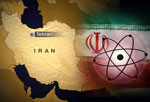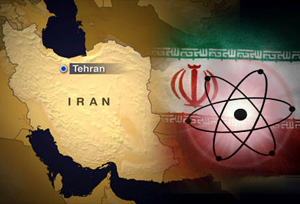 Reuters: Western powers pressed Iran on Tuesday to enter wide-ranging talks about its disputed nuclear program, with France telling Tehran this was the alternative to “costly” sanctions on the major oil producer.
Reuters: Western powers pressed Iran on Tuesday to enter wide-ranging talks about its disputed nuclear program, with France telling Tehran this was the alternative to “costly” sanctions on the major oil producer.
By Fredrik Dahl and Sylvia Westall
 VIENNA (Reuters) – Western powers pressed Iran on Tuesday to enter wide-ranging talks about its disputed nuclear program, with France telling Tehran this was the alternative to “costly” sanctions on the major oil producer.
VIENNA (Reuters) – Western powers pressed Iran on Tuesday to enter wide-ranging talks about its disputed nuclear program, with France telling Tehran this was the alternative to “costly” sanctions on the major oil producer.
They made clear at a meeting of the U.N. atomic watchdog that the Islamic state must address broader concerns about work the West suspects is a veiled quest to develop bombs, and not just seek more talks on a proposed swap of nuclear material.
Iran, which has called for speedy negotiations on the fuel swap idea but has listed conditions for broader talks, says its uranium enrichment work is aimed at civilian power production.
Jochen Homann, from Germany’s Economics and Technology Ministry, said the six powers involved in efforts to defuse the nuclear standoff were willing to hold immediate talks with Iran.
“(We) have presented a comprehensive offer of cooperation. Iran should follow up its words with deeds and return to the negotiating table now,” Homann said in a speech to the annual assembly of the International Atomic Energy Agency (IAEA).
His comments were echoed by the French delegate, who said Iran’s behavior had left the powers no choice but to impose a series of tougher sanctions measures on the country since June.
“In acting in this fashion the international community is showing Iran that its choices are very costly indeed, ever more so,” said Bernard Bigot of France’s Atomic Energy Commission.
But, he added, “we are convinced that a negotiated solution of the crisis is possible. We continue to appeal to Iran to finally choose to cooperate.”
OPEN DOOR
Their message to Iran is expected to be underlined by U.S. President Barack Obama when he addresses the United Nations General Assembly Thursday in New York. The White House said he will tell Iran the “door is open” to better relations if it can demonstrate the peaceful intent of its nuclear program.
The Islamic Republic has repeatedly rejected international demands to shut down all enrichment-related activities, saying it has a sovereign right to atomic energy, and has refused to provide unfettered access for U.N. nuclear inspectors.
Enriched uranium can fuel nuclear power plants or, if refined to a high level of purity, provide bomb material.
Iran’s nuclear energy chief Ali Akbar Salehi called on major powers Monday to restart talks on a plan to provide fuel to a Tehran medical reactor in exchange for some of its low-enriched uranium stockpile — potential bomb material if refined further.
But U.S. Deputy Energy Secretary Daniel Poneman said “the facts on the ground” had changed since a tentative agreement on the issue was struck last year, only to crumble soon afterwards.
He was referring to Iran’s effort to enriched uranium to a higher grade and boost its reserves of the strategic material.
“I’m not ruling anything in or out,” he told reporters when asked about Monday’s call by Ali Akbar Salehi at the IAEA.
“They had an offer before them. They did not respond favorably to the offer. The facts on the ground have changed. They need to do something,” Poneman said.
Last October the United States, France, Russia and the IAEA brokered a plan which at the time would have divested Iran of 70 percent of its LEU stockpile in return for medical reactor fuel.
Regarded at the time by world powers as a prospective confidence-building step since Iran would ship out material which could be used to make a bomb, the deal fell apart after Tehran backed away from initial terms for an atomic fuel swap.
“We believe it is very important that they should engage on the wider sweep of issues,” Poneman added, alluding to talks between Iran and six world powers last year that were aimed at yielding a halt to Iran’s secretive enrichment activity in exchange for trade and diplomatic benefits, but stalled.
Iran has said broader talks could restart if more states are involved, if parties say whether they seek friendship or hostility with the Islamic Republic and if they express their view on Israel’s alleged nuclear arsenal.
(Editing by Mark Heinrich)


